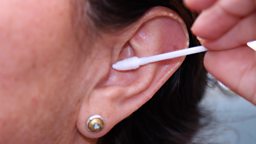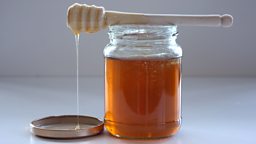Could aromatherapy actually affect my memory?
We’d all like a better memory: remembering people’s names, remembering to phone the garage, remembering to post that letter. Well, it seems there might be a way to improve our memory that's been under our noses since ancient times.
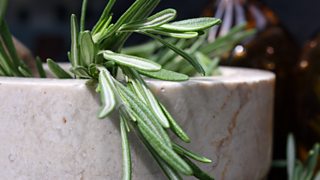
As long ago as ancient Greece, extracts of aromatic plants were used for cosmetic and medical purposes. Today the popularity of aromas for pleasure, relaxation and therapeutics is seen in the popular practice of aromatherapy. But can aromas really have a measurable effect on the behaviour of our brain?
A small but growing body of research is providing evidence of how aromas might affect our cognitive abilities. Trust Me, I'm A Doctor has been to Northumbria University, where a team led by Dr Mark Moss has been investigating one particular aroma and its effect on memory.
What is memory?
We tend to think of ‘memory’ as a single aspect of brain function, but in fact there are different kinds of memory.
- Past Memory – this is our store of memories we have already laid down, our recollections of past experiences.
- Present Memory – this is our ‘working’ memory, our short term memory, the ability to juggle the tasks we have to do daily.
- Future Memory – this is prospective memory, ‘remembering to remember’, this is remembering to do things in the future like post a letter on the way to work, remember to take your warfarin at 6pm, remembering to pick the children up from school.
The experiment
: we ‘forget to remember’ to do something. While forgetting someone’s name or the year is irritating, prospective memory failure can have real world implications. For example, avoid the wrath of a loved one when you forget to post that birthday card, or more seriously, remembering to take medication.
Dr Mark Moss and his team have been testing out one particular aroma on this kind of memory. Chronicled in Shakespeare’s Hamlet, rosemary has long been associated with memory “There’s rosemary, that’s for remembrance, Pray you, love, remember. And there is pansies, that’s for thoughts” (Act 4: Scene 5)
The team at Northumbria have devised a protocol that tests our prospective or future memory and using over 60 older volunteers they set out to test the effects of not only rosemary but also lavender and pitted these two against a control group.
Rosemary and lavender
1,8-cineole, a compound found in the essential oil of rosemary has previously been shown to act on the biochemical systems that underpin memory. It also is found in other plants (eg eucalyptus) but without the same memory enhancing effects.
Lavender is a reputed sedative and anxiolytic. Modern pharmaceutical drugs with these effects also affect cognition. Hence the 'do not drive etc' warnings if you are prescribed these. Lavender therefore seemed an interesting choice for a second plant aroma to test in the experiment.
Intervention
Tested one by one, volunteers - all healthy older adults - entered a room that was infused either with rosemary essential oil, lavender essential oil, or no aroma at all. To infuse the rooms in the former two cases, four drops of the essential oil were placed on an aroma stream fan diffuser, which was switched on five minutes before the test began.
Participants were told they were there to test a vitamin water drink. If they commented on the aromas, they were told that the scent was irrelevant, left over from the previous group to use the room. This meant that the volunteers were unaware that what was being tested was the effect of the aromas.
Tasks
Each volunteer completed a test designed to assess their prospective memory. This included tasks such as hiding objects and asking participants to find them at the end of the test, and instructing them to pass a specified object to the researcher at a particular time.
No prompting was offered initially, but if any part of a task was not performed at the allotted time, different degrees of prompting were used. The more prompting required, the lower the score. The volunteers also completed questionnaires assessing their mood.
Blood tests
Blood was taken from volunteers and analysed to see if performance levels and changes in mood following exposure to the rosemary aroma were related to concentrations of a compound known as 1,8-cineole present in the blood.
The results
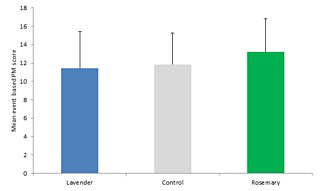
For the ‘Event based’ prospective memory measure (this is a measure of accuracy of performance based on remembering to do something as a consequence of an event occurring in the procedure).
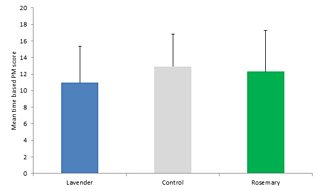
And for the ‘Time based’ prospective memory measure (this is a measure of accuracy of performance based on remembering to do something as a consequence of a specified time having been reached during the procedure).
How does rosemary essential oil improve our memory?
1,8-Cineole
Mark Moss and Lorraine Oliver at Northumbria University, Newcastle .
Terpenes are primary components of essential oils and are often strong smelling, responsible for a diverse array of natural aromas. .
It’s possible that the 1,8-cineole (and potentially other compounds) from rosemary is (are) acting on the cholinergic neurotransmitter system, and these neurons are widespread across the brain. Prospective memory has been shown in brain imaging studies to activate the frontal lobes of the brain (as well as other areas to a lesser extent). There are lots of cholinergic neurons in the frontal lobes and drugs that are used to treat dementia have been shown to enhance cholinergic activity in the frontal lobes. Put all that together and it would seem plausible that the mechanism of impact of rosemary on prospective memory would be via frontal lobe cholinergic neurons.
It is likely that rosemary does affect other parts of the brain. For example long term memory is located in the hippocampus and this structure has the greatest density of cholinergic neurons in the brain. As rosemary improves long term memory it seems plausible that this effect is via cholinergic neurons in the hippocampus.
Rosemary in history
Rosemary has been associated with memory enhancement since ancient times, it has been referred to from the latter part of the Elizabethan Era to the Early Romantic period as the herb of remembrance. In Shakespeare’s Hamlet, Ophelia says, “There’s rosemary, that’s for remembrance.”(Hamlet, iv. 5.) It has also long been used as a symbol for remembrance during weddings, war commemorations and funerals in Europe and Australia. Mourners in old times would wear it as a buttonhole, burn it as incense or throw it into graves as a symbol of remembrance for the dead.








